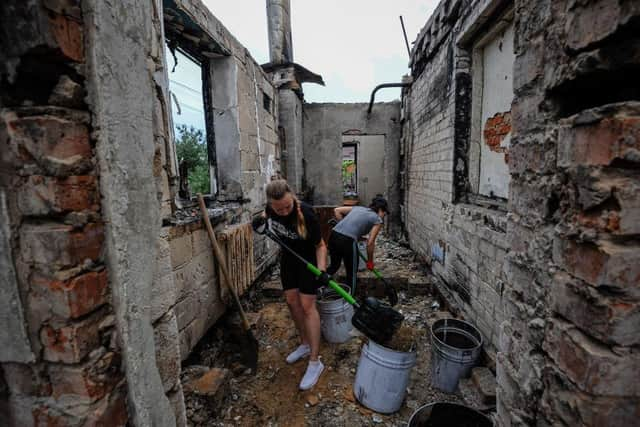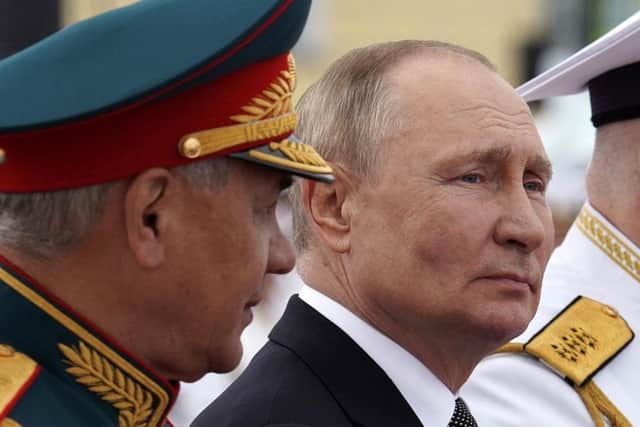War in Ukraine: Eight ways in which Russia’s invasion has changed the world
As the conflict has continued over the past six months, the global impact of the war has become increasingly apparent.
Here we take a look at some of the many ways the world has changed.
Advertisement
Hide AdAdvertisement
Hide AdMillions of Ukrainians are living temporarily in other countries


The war has sparked one of the biggest refugee crises that Europe has ever seen. More than 12 million Ukrainians are believed to have left their homes to take shelter in other countries. Many have remained as close to their homeland as possible, staying in places such as Poland and Romania, where they can easily cross back over the border. Men aged between 18 and 60 are not allowed to leave the country, in case they are needed for the war effort, meaning many families are hoping to return home – to reunite with husbands, fathers and brothers – as soon as possible.
Scotland has so far taken in more than 13,000 Ukrainian refugees, many of them under the Scottish Government’s Super Sponsor scheme.
The world order is changing


Russian president Vladimir Putin’s invasion of Ukraine has set out his ambitions clearly – he wants to be seen as a major world leader. In a speech earlier this summer, Mr Putin compared himself to 18th-century Russian tsar Peter the Great, drawing a parallel between what he sees as their quests to win back Russian territory.
Meanwhile, through the increased tensions between Russia and the West, another alliance has become evident – one between Russia and China. At the recent East Asia summit, Chinese foreign minister Wang Yi made a public display of the country’s relationship with Russia as he patted Sergey Lavrov on the shoulder as he entered the room and waved at his Russian counterpart before taking his own seat. Russia, in turn, supported China over issues relating to Taiwan, with Mr Lavrov walking out of the room with Mr Wang, as the Japanese foreign minister began to speak.
Analysts have warned that a shift to two “globalisations” – one led by the China-Russia alliance and the other by the US, could have catastrophic implications for issues such as climate change.
The world is facing an energy crisis
Heightened tensions between Russia and the West has led to energy giant Gazprom’s decision to cut back on gas imports to Europe, sparking an energy crisis on the continent. Gazprom said this week it would entirely halt gas flows to Europe from August 31 until September 2, claiming its shutdown of the NordStream pipelines is necessary for maintenance. The closure is the second this summer, after NordStream 1 was shut for maintenance from July 11 for ten days.
Some countries have taken measures to cut back on their reliance on gas, including the German city of Hanover, which put in place a series of new rules which ban municipal buildings from putting on heating before October 1 and after March 31.
Although the UK is not directly reliant on a large amount of Russian gas, the general rise in global demand from other sources is pushing prices higher here too, fuelling increases in already-spiralling utility bills.
Advertisement
Hide AdAdvertisement
Hide AdWestminster, however, has insisted households and businesses will not face blackouts this winter after importing gas from Australia.
Millions of people are facing famine while, for others, food prices are spiralling
A block on Ukrainian grain exports since the beginning of the war had sparked fears of famine around the world, especially in third world countries already struggling with a lack of food.
In the West, warnings were given the shortage could push food prices even higher, at a time when inflation is already soaring. Products based on Ukrainian goods, such as sunflower oil, have been in short supply and many food manufacturers have had to change their recipes to use different ingredients.
Ukraine’s stores hold 20 million tonnes of grain, which it was unable to export, until a deal was brokered by Turkey. That deal allowed the first shipment to leave the Black Sea at the end of July. However, experts say that re-starting exports from Ukraine will have only a small effect on a global food crisis the United Nations has warned could last for years.
Fears over nuclear war have resurfaced for the first time since the end of the Cold War
Concerns over a looming nuclear war between Russia and the US, known as the Cold War, which dominated the second half of the 20th century, dissipated after the dissolution of the Soviet Union in 1991. However, the invasion of Ukraine by Russia – and Mr Putin’s rhetoric around his intentions in the region – have led some observers to suggest the Cold War could return.
Russian state television has repeatedly made threats relating to nuclear weapons against the West, if military action is taken against Russia by the likes of Nato.
Further nuclear fears were heightened this month after fighting broke out around the Zaporizhzhya nuclear power plant in south-eastern Ukraine, which is occupied by Russian troops. Russia has denied carrying out shelling near the plant.
Questions over the safety of nuclear power plants during a conflict come as the UK Government gave the go-ahead for a new plant in England in July.
Advertisement
Hide AdAdvertisement
Hide AdUkraine and the UK have forged a special relationship
Outgoing prime minister Boris Johnson has been a staunch ally of Ukraine since the invasion began. As one of the first world leaders to visit Kyiv during the conflict, he has forged a friendship with Ukrainian president Voloymyr Zelensky. The Prime Minister’s popularity in the country, which has dubbed him “Borys Johnsoniuk” in an affectionate “Ukrainianisation” of his name and where he was made an honorary citizen of the city of Odesa, saw Ukrainians disappointed when he finally announced he was stepping down.
Mr Zelensky has regularly described Mr Johnson as a “great friend” of Ukraine, but insisted he was sure relations would not change under any new prime minister.
Countries have increased defence spending
Nato has described Russia as the biggest "direct threat" to Western security, prompting many nations to increase spending on defence.
In June, the UK said it was boosting defence spending to 2.5 per cent of its gross domestic product (GDP) by the end of this decade, to adapt to a “more dangerous and more competitive world”. Last year, the UK spent £42.4 billion on defence, which was a £2.5bn increase on the previous year. Meanwhile, the US House of Representatives Armed Services Committee in June backed a proposal to increase spending for the Department of Defence by $37bn on top of the record $773bn already proposed by President Joe Biden.
McDonalds no longer operates in Russia
When McDonalds opened its first Russian branch in Moscow in 1990, locals queued around the block for a chance to try the fast food brand, which had become ubiquitous with Western Capitalism.
Just weeks after the invasion of Ukraine, the American firm announced it would temporarily close its 850 branches in Russia and announced plans to sell off the estate – and entirely exit Russia – in May, in an equally symbolic move. The chain was bought over by a Russian businessman, Alexander Govor, who opened his own version, “Vkusno-i tochka”, which translates as “Tasty and that’s it”. Other major Western chains, such as Starbucks, have also closed and been bought over by Russian entrepreneurs.
Comments
Want to join the conversation? Please or to comment on this article.
